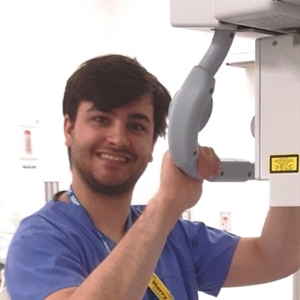 What year did you graduate?
What year did you graduate?
2018
What course did you study?
BSc Diagnostic Radiography
What is your current role?
Senior Radiographer at the Royal London Hospital.
How did you get into your current role?
During my final year of Radiography, I applied for a junior Radiographer post in early December. After successfully interviewing in early January, I was able to focus on completing my BSc. 21 months after starting as a junior, I successfully applied for a senior role.
Can you describe a typical day?
At the Royal London a rotational Radiographer rotates through adult and paediatric plain film, fluoroscopy, mobile, theatre and dental x-ray. Seniors add CT and interventional radiology (IR) to that rotation as well. I am also the elective and work experience coordinator which day to day involves a lot of managing students to ensure they get the most out of short experiences at the trust. Alongside this, I attend Imperial College and the Royal College of Art to study part-time MSc Healthcare and Design, which means my days can be quite busy, balancing my imaging, administrative and academic responsibilities!
What do you enjoy about your role?
The support for training and study in my role is very good; this allows me to enjoy a career that embracing development of imaging skill, alongside other skills. Day to day, I most enjoy organising teams, which is something you get to do very early on in your career at the Royal London whilst acting as the theatre coordinator (part of the normal rotation), where you manage a team of 8 radiographers for the day. I also enjoy needing to think outside of the box in both adult and paediatric situations to get the best imaging possible.
What do you find challenging in your current role?
For me in particular, time management is a challenge, due to my multiple workplace responsibilities. I find myself needing to be very organised and start things early just to have enough time to complete all my tasks! In the department, you can face challenging patients, in particular the non-cooperative or abusive patient, which is a reality any budding radiographer must prepare themselves for. Fortunately at the Royal London we have a large and highly supportive team, so you will rarely find yourself far from help, which mostly arrives when you need it without the need to call.
What advice would you give to a current student at St George’s who is keen to get in to a similar area of work as you?
Everything is about hard work. Radiography is not the kind of subject you do well in just by being naturally clever. If you want to study and work in this area, you need to put the hours in early and on your own time. You would also do well to remember that even after you cease to be a student, you are always a student. Being kind goes a long way as well! The biggest mistake you can make is waiting to start things until told to. If you want to have multiple responsibilities like I do, you need to be willing to constantly look for opportunities on your own time, talk to people about your aspirations (do not keep them to yourself), be ready to navigate resistance and always have a back-up plan for your back-up plan. Also be willing to work after work!
Which aspects of your degree are relevant for your current role?
All of it. There are even elements that, at the time, you think are pointless but have been placed there for a reason by lecturers who are all very experienced in the field. You are not studying for a grade, you are studying for your patients, your students and yourself.
What would you say were the best / most challenging things about your degree?
The background knowledge. These are things that you do not learn by doing in the departments, such as how the technology works. If you really understand how the image is formed, you can often work out how to adjust your technique in non-obvious ways, which regularly benefits you in practice.
If you could go back to your time at St George’s, would you do anything differently?
Not really. Radiography was my second bachelor’s degree and I had already learnt what to do and avoid in my first, so I hit the ground running, took on a lot of extra responsibilities but always made academics my primary focus.
Do you have any advice or a message for current students at St George’s?
There is a lot you will not remember about your degree one day but you will always remember your grade. Getting a good one is stems from how many hours you put in outside of direct contact hours and how engaged you are during them.
Do you have any advice or a message for students considering studying at St George’s?
Go for it. It was a great place to study and has recently gone through a lot of improvement in its Radiography department to make it even better. Get involved with the university, in and outside of your course and you will remember your time fondly when you leave.